
 The Best Supplements for a Healthy & Active Summer
The Best Supplements for a Healthy & Active Summer
Summer is a superb time to focus on physical health – the pleasant weather helps patients naturally feel like being more vigorous and active outdoors. This educational article reviews five natural supplement options that could be highly beneficial for your patients during an active, fun, and healthy summer. According to research, supplementing with zinc, vitamin C, citrus bioflavonoids, magnesium, and Ashwagandha could support optimal hormone levels, energy production, injury recovery, athletic performance, and more!
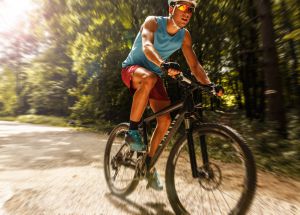 Zinc for Healthy Testosterone Levels and Top Athletic Performance
Zinc for Healthy Testosterone Levels and Top Athletic Performance
Zinc is the second-most abundant trace element in the human body and plays a crucial role in many metabolic processes, including energy metabolism, immune function, hormone production, and muscle contraction.1-3 Zinc does not readily accumulate in the body; therefore, it is essential to consume this mineral daily from foods and/or supplementation.2,4 It is recommended that most adults consume at least 14 mg of zinc daily.5
Zinc is a component of over 300 crucial enzymes, so a zinc deficiency could significantly impair health.6 Roughly two billion people worldwide are affected by suboptimal zinc status, and a severe zinc deficiency may contribute to multiple disorders, including immune abnormalities, abnormal hormone levels, and skin concerns. Zinc deficiency is also associated with the development of cardiovascular diseases and anemia. Since approximately 60% of all zinc in the body is in muscle and only 0.1% is in the blood plasma, the blood zinc level is not a reliable marker of zinc status.3 Thus, the clinical diagnosis of zinc deficiency can be challenging.
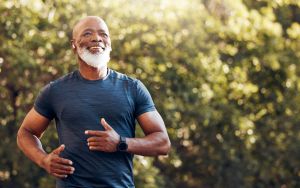
Zinc deficiency affects testosterone levels due to the role zinc plays in hormone metabolism and its impact on steroid hormone receptors.7 The pituitary hormone luteinizing hormone (LH) stimulates testosterone production in the Leydig cells in the male reproductive system. Zinc is required for both the synthesis and secretion of LH, so testosterone production is zinc-dependent.4,5
Several studies show that zinc status correlates with testosterone levels in the blood. Research has also demonstrated the restoration of optimal testosterone levels after zinc supplementation, confirming the physiologic relationship.8
When evaluating the systemic effects of a hormone, though, one must consider not only the free hormone level but also the number and sensitivity of receptors. Once the testosterone binds to the receptor, it facilitates hormonal actions at the cellular level. An animal study demonstrated that zinc deficiency decreases the number of testosterone-binding sites, which could then reduce the systemic impact of any bioavailable, free testosterone.9 Therefore, optimal zinc status supports healthy testosterone production and function in several ways.
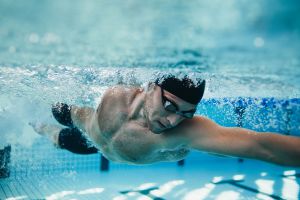 Athletes and Zinc Deficiency
Athletes and Zinc Deficiency
It is fascinating to note that research suggests competitive athletes are at a greater risk for zinc deficiency than the general population.2 A study that examined the effect of zinc supplementation on testosterone concentrations in healthy young adults before and after exhaustive exercise reported that zinc supplementation increased testosterone levels compared to pre-supplementation levels.5
Furthermore, research suggests insufficient dietary zinc intake may decrease exercise performance by affecting glucose uptake, glycogen synthesis, strength, endurance, aerobic power, insulin signaling, protein synthesis, and muscle repair mechanisms.1,3-7,10
According to a study by Maynar et al., swimmers with the highest degree of training had the lowest RBC zinc levels. Therefore, intense exercise likely reduces the red blood cell (RBC) concentrations of zinc, which could then impair athletic performance. For this reason, active individuals could consider monitoring the zinc level in their red blood cells and supplementing with zinc to avoid the detrimental effects of a zinc deficiency on athletic performance.2
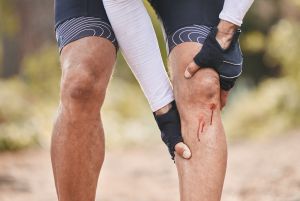 Supplement with Zinc to Treat Summer Sports Injuries
Supplement with Zinc to Treat Summer Sports Injuries
Zinc plays a significant role in wound healing, and injuries often occur during physical summer sports and activities. Studies dating back to at least the 1970s demonstrate the importance of optimal zinc status for wound healing in patients with burn injuries and those recovering from surgery. Zinc is critically important for skin health, and approximately 5% of the zinc in the body is in the skin. Mild zinc deficiency is associated with roughened skin and impaired wound healing.11
Zinc helps coordinate every phase of the wound-healing process. Specifically, zinc affects membrane repair, oxidative stress, inflammation, immune defense, tissue regeneration, blood vessel regeneration, and scar formation.11,12 Animal studies of the wound-healing process have shown that within the first 24 hours after injury, there is a 15% to 20% increase in zinc levels near the wound, which surges to 30% as healing continues.12
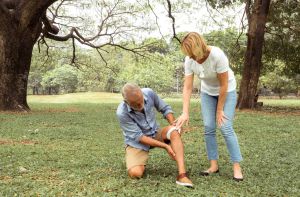 Vitamin C Can Increase Free Testosterone Levels and Heal Common Summer Injuries
Vitamin C Can Increase Free Testosterone Levels and Heal Common Summer Injuries
Vitamin C is an essential vitamin that must be consumed daily. It is abundant in the endocrine system and regulates adrenal and gonadal steroid hormone production, including testosterone production. There is also a high concentration of vitamin C in the pituitary gland in the brain, and vitamin C appears to play a significant role in the secretion of several pituitary hormones, including follicle-stimulating hormone (FSH) and luteinizing hormone (LH).13
Since testosterone production is regulated by LH, adequate vitamin C intake is necessary for optimal testosterone levels. One animal study demonstrated that vitamin C administration significantly increased testosterone production by over 400% in three weeks.13 Several additional animal studies confirm the administration of vitamin C facilitates healthy testosterone production in general.14-16
Research also shows that Vitamin C protects against the effects of toxic substances that could impact the testosterone level, including alcohol, medications, and toxic metals.17-24 And, like zinc, vitamin C is required for optimal wound healing. Since vitamin C promotes the synthesis of collagen and a healthy inflammatory response, it supports the healing of cuts, scrapes, sprains, strains, and other common summertime injuries.25-29
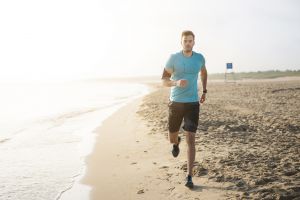 Supplement with Bioflavonoids to Power Your Summer Workout!
Supplement with Bioflavonoids to Power Your Summer Workout!
Bioflavonoids are natural compounds derived from fruits, such as oranges, lemons, limes, pomegranates, cherries, and berries. Recent studies show that bioflavonoids offer anti-inflammatory and antioxidant effects that could provide a clinically effective strategy to enhance muscle strength and improve muscle recovery after exercise.30,31 Nutritional supplementation is commonly used by athletes – should your athletic patients consider adding bioflavonoids to their supplement protocol?
Let’s look at the research!
A clinical trial that assessed whether supplementation with a citrus bioflavonoid complex for up to 8 weeks improved anaerobic exercise capacity concluded YES – daily supplementation with a citrus bioflavonoid complex significantly improves anaerobic capacity and peak power during high-intensity exercise in moderately trained individuals. Another clinical study showed bioflavonoids increased maximal power output, average power, and total power output during high-intensity exercise without inducing more fatigue.30
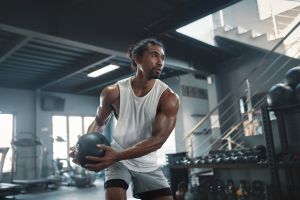
Moreover, research shows citrus bioflavonoid supplementation improves vascular function by reducing inflammation and stimulating nitric oxide production. Increased nitric oxide production is associated with the dilation of blood vessels, which decreases blood pressure and increases blood flow to active muscles. The increased blood flow clears fatigue-related metabolic waste and delivers critical nutrients and oxygen to the active muscles.30,31
Overall, studies have determined bioflavonoids increase average power by 2.3% to 5%, maximum speed by 3.2%, peak power by 3.7%, and total energy by 2.6% without increasing the maximum heart rate (HR).30 Furthermore, bioflavonoids may exert other intracellular effects that support mitochondrial function to maintain a high energy level. Research shows bioflavonoids induce the biogenesis of new mitochondria, which can then produce additional cellular energy.31 According to the latest research, citrus bioflavonoids should be included in a supplement protocol to maximize athletic performance and capacity.
 Supplement with Magnesium to Boost Energy Levels for Fun Summer Activities!
Supplement with Magnesium to Boost Energy Levels for Fun Summer Activities!
Adenosine triphosphate (ATP) is “the universal energy currency for all living cells.”32 Magnesium, an essential mineral, is required for the production and utilization of ATP in the body. Every molecule of ATP must bind to magnesium for conversion into its biologically functional form, Magnesium-ATP (Mg-ATP) complex. In the mitochondria, the Mg-ATP complexes export the mitochondrial ATP from the mitochondria into the cell so the ATP can be used as energy outside the mitochondria.33
Research shows magnesium status directly affects energy levels. One clinical trial demonstrated daily magnesium supplementation for four weeks reduced fatigue in twenty-five female adults. A study in physically active college students found that endurance performance increased after magnesium supplementation, and a randomized controlled trial that included 26 untrained young adults discovered seven weeks of magnesium supplementation significantly improved muscle strength compared with a placebo.33
Research suggests higher magnesium intakes are associated with lower oxygen needs and better cardiorespiratory function in aerobic exercise, which indicates magnesium contributes to efficient energy metabolism and improved endurance.33 In a recent clinical trial, participants who took a synergistic blend of B vitamins and minerals, including magnesium, for 28 days reported improved ratings of alertness, mental and physical stamina, and ability to concentrate.34
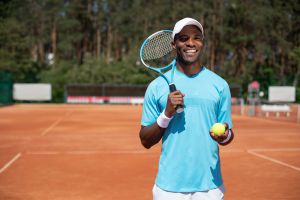 Ashwagandha (Withania somnifera) to Boost Summer Sports Performance and Recovery
Ashwagandha (Withania somnifera) to Boost Summer Sports Performance and Recovery
Ashwagandha (Withania somnifera), a botanical medicine prescribed by Ayurvedic practitioners for thousands of years, exerts significant beneficial effects on energy, mitochondrial health, and athletic performance by several mechanisms. Research shows Ashwagandha extracts improve mitochondrial health, increase hemoglobin concentration and red blood cell counts, optimize oxygen delivery to muscles, boost aerobic capacity in athletes, provide antioxidant protection, and enhance energy production. Athletes supplement with Ashwagandha for improved muscular strength, resistance to fatigue, recovery from exercise, and competitive advantage.35-38
A clinical trial including 50 participants found that supplementation with a highly concentrated extract of Ashwagandha led to increased VO2 max, enhanced cardiorespiratory endurance, and improved quality of life in healthy athletes. The results suggest that Ashwagandha root extract improves the function of the cardiovascular system by increasing the VO2 max levels, which determine an athlete’s ability to take in, transport, and utilize oxygen. The VO2 max level represents long-term aerobic and cardiovascular endurance capabilities, and the VO2 max test is considered the gold standard for measuring cardiorespiratory fitness in athletes.35,36,38 Read this article for more information about the clinical effects of Ashwagandha on fitness.
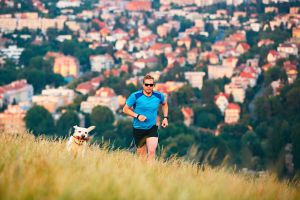
Zinc, vitamin C, citrus bioflavonoids, magnesium, and Ashwagandha are supplements patients could consider incorporating into their daily routine this summer. Research confirms they support optimal testosterone levels, quick recovery from summertime injuries, and improved athletic performance for a healthy, active, safe, and fun summer!
 Test Free (Salivary) Testosterone Levels this Summer!
Test Free (Salivary) Testosterone Levels this Summer!
Salivary (free) testosterone can be ordered as part of a:
- Bone Health Panel
- Customized Flexi-Matrix panel
- Male Hormone Panel and Expanded Male Hormone Panel
- Cycling Female Hormone Panel and Expanded Cycling Female Hormone Panel
- Peri Menopause Hormone Panel and Expanded Peri Menopause Hormone Panel
- Post Menopause Hormone Panel and Expanded Post Menopause Hormone Panel
Salivary (free) testosterone can also be ordered as a single test.
To place a test order, click here. As a reminder, DiagnosTechs will drop ship test kits directly to your patients. You may select this option at the top of the order form.
Please visit our Provider Tools page for more information about choosing the right test and supporting the androgen pathway.
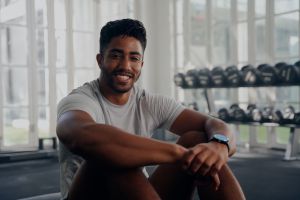 References:
References:
- Shaw KA, Zello GA, Rodgers CD, et al. Benefits of a plant-based diet and considerations for the athlete. Eur J Appl Physiol. 2022;122(5):1163-1178.
- Maynar M, Grijota FJ, Siquier-Coll J, et al. Erythrocyte concentrations of chromium, copper, manganese, molybdenum, selenium and zinc in subjects with different physical training levels [published correction appears in J Int Soc Sports Nutr. 2021;18(1):30]. J Int Soc Sports Nutr. 2020;17(1):35. doi:10.1186/s12970-020-00367-4
- Hernández-Camacho JD, Vicente-García C, Parsons DS, et al. Zinc at the crossroads of exercise and proteostasis. Redox Biol. 2020;35:101529.
- Fallah A, Mohammad-Hasani A, Colagar AH. Zinc is an Essential Element for Male Fertility: A Review of Zn Roles in Men’s Health, Germination, Sperm Quality, and Fertilization. J Reprod Infertil. 2018;19(2):69-81.
- Zamir A, Ben-Zeev T, Hoffman JR. Manipulation of Dietary Intake on Changes in Circulating Testosterone Concentrations. Nutrients. 2021;13(10):3375. doi:10.3390/nu13103375
- Williams MH. Dietary supplements and sports performance: minerals. J Int Soc Sports Nutr. 2005;2(1):43-49.
- Kerksick CM, Wilborn CD, Roberts MD, et al. ISSN exercise & sports nutrition review update: research & recommendations. J Int Soc Sports Nutr. 2018;15(1):38.
- Prasad AS, Mantzoros CS, Beck FW, et al. Zinc status and serum testosterone levels of healthy adults. Nutrition. 1996;12(5):344-8. doi:10.1016/s0899-9007(96)80058-x
- Om AS, Chung KW. Dietary zinc deficiency alters 5 alpha-reduction and aromatization of testosterone and androgen and estrogen receptors in rat liver. J Nutr. 1996;126(4):842-8. doi:10.1093/jn/126.4.842
- Chu A, Petocz P, Samman S. Plasma/Serum Zinc Status During Aerobic Exercise Recovery: A Systematic Review and Meta-Analysis. Sports Med. 2017;47(1):127-134.
- Lin PH, Sermersheim M, Li H, et al. Zinc in Wound Healing Modulation. Nutrients. 2017;10(1):16. doi:10.3390/nu10010016
- Han B, Fang WH, Zhao S, et al. Zinc sulfide nanoparticles improve skin regeneration. Nanomedicine. 2020;29:102263. doi:10.1016/j.nano.2020.102263
- Okon UA, Utuk II. Ascorbic acid treatment elevates follicle stimulating hormone and testosterone plasma levels and enhances sperm quality in albino Wistar rats. Niger Med J. 2016;57(1):31-36. doi:10.4103/0300-1652.180570
- Moghimian M, Soltani M, Abtahi H, et al. Effect of vitamin C on tissue damage and oxidative stress following tunica vaginalis flap coverage after testicular torsion. J Pediatr Surg. 2017;52(10):1651-1655. doi:10.1016/j.jpedsurg.2017.07.001
- Rizk NI, Rizk MS, Mohamed AS, Naguib YM. Attenuation of sleep deprivation dependent deterioration in male fertility parameters by vitamin C. Reprod Biol Endocrinol. 2020;18(1):2. doi:10.1186/s12958-020-0563-y
- Sönmez M, Türk G, Yüce A. The effect of ascorbic acid supplementation on sperm quality, lipid peroxidation and testosterone levels of male Wistar rats. Theriogenology. 2005;63(7):2063-72. doi:10.1016/j.theriogenology.2004.10.003
- Ayinde OC, Ogunnowo S, Ogedegbe RA. Influence of Vitamin C and Vitamin E on testicular zinc content and testicular toxicity in lead exposed albino rats. BMC Pharmacol Toxicol. 2012;13:17. doi:10.1186/2050-6511-13-17
- Zeng L, Zhou J, Wang X, et al. Cadmium attenuates testosterone synthesis by promoting ferroptosis and blocking autophagosome-lysosome fusion. Free Radic Biol Med. 2021;176:176-188. doi:10.1016/j.freeradbiomed.2021.09.028
- Sen Gupta R, Sen Gupta E, Dhakal BK, et al. Vitamin C and vitamin E protect the rat testes from cadmium-induced reactive oxygen species. Mol Cells. 2004;17(1):132-9.
- Mouro VGS, Martins ALP, Silva J, et al. Subacute Testicular Toxicity to Cadmium Exposure Intraperitoneally and Orally. Oxid Med Cell Longev. 2019;2019:3429635. doi:10.1155/2019/3429635
- Min Y, Sun T, Niu Z, et al. Vitamin C and vitamin E supplementation alleviates oxidative stress induced by dexamethasone and improves fertility of breeder roosters. Anim Reprod Sci. 2016;171:1-6. doi:10.1016/j.anireprosci.2016.04.005
- Murugesan P, Muthusamy T, Balasubramanian K, et al. Studies on the protective role of vitamin C and E against polychlorinated biphenyl (Aroclor 1254)–induced oxidative damage in Leydig cells. Free Radic Res. 2005;39(11):1259-72. doi:10.1080/10715760500308154
- Harikrishnan R, Abhilash PA, Syam Das S, et al. Protective effect of ascorbic acid against ethanol-induced reproductive toxicity in male guinea pigs. Br J Nutr. 2013;110(4):689-98. doi:10.1017/S0007114512005739
- Babcock MC, DuBose LE, Witten TL, et al. Oxidative Stress and Inflammation Are Associated With Age-Related Endothelial Dysfunction in Men With Low Testosterone. J Clin Endocrinol Metab. 2022;107(2):e500-e514. doi:10.1210/clinem/dgab715
- Palmieri B, Vadalà M, Laurino C. Nutrition in wound healing: investigation of the molecular mechanisms, a narrative review. J Wound Care. 2019;28(10):683-693. doi:10.12968/jowc.2019.28.10.683
- Pullar JM, Carr AC, Vissers MCM. The Roles of Vitamin C in Skin Health. Nutrients. 2017;9(8):866. doi:10.3390/nu9080866
- Martel M, Laumonerie P, Girard M, et al. Does vitamin C supplementation improve rotator cuff healing? A preliminary study. Eur J Orthop Surg Traumatol. 2022;32(1):63-70. doi:10.1007/s00590-021-02926-0
- Lui PPY, Zhang X, Yao S, et al. Roles of Oxidative Stress in Acute Tendon Injury and Degenerative Tendinopathy-A Target for Intervention. Int J Mol Sci. 2022;23(7):3571. doi:10.3390/ijms23073571
- Heaton LE, Davis JK, Rawson ES, et al. Selected In-Season Nutritional Strategies to Enhance Recovery for Team Sport Athletes: A Practical Overview. Sports Med. 2017;47(11):2201-2218. doi:10.1007/s40279-017-0759-2
- van Iersel LE, Stevens YR, Conchillo JM, et al. The effect of citrus flavonoid extract supplementation on anaerobic capacity in moderately trained athletes: a randomized controlled trial. J Int Soc Sports Nutr. 2021;18(1):2. doi:10.1186/s12970-020-00399-w
- Overdevest E, Wouters JA, Wolfs KHM, et al. Citrus Flavonoid Supplementation Improves Exercise Performance in Trained Athletes. J Sports Sci Med. 2018;17(1):24-30.
- Song J. Adenosine triphosphate energy-independently controls protein homeostasis with unique structure and diverse mechanisms. Protein Sci. 2021;30(7):1277-1293. doi:10.1002/pro.4079
- Tardy AL, Pouteau E, Marquez D, et al. Vitamins and Minerals for Energy, Fatigue and Cognition: A Narrative Review of the Biochemical and Clinical Evidence. Nutrients. 2020;12(1):228. doi:10.3390/nu12010228
- Kennedy DO, Veasey RC, Watson AW, et al. Vitamins and psychological functioning: a mobile phone assessment of the effects of a B vitamin complex, vitamin C and minerals on cognitive performance and subjective mood and energy. Hum Psychopharmacol. 2011;26(4-5):338-47. doi:10.1002/hup.1216
- Singh N, Bhalla M, de Jager P, et al. An overview on ashwagandha: a Rasayana (rejuvenator) of Ayurveda. Afr J Tradit Complement Altern Med. 2011;8(5 Suppl):208-213. doi:10.4314/ajtcam.v8i5S.9
- Choudhary B, Shetty A, Langade DG. Efficacy of Ashwagandha (Withania somnifera [L.] Dunal) in improving cardiorespiratory endurance in healthy athletic adults. Ayu. 2015;36(1):63-68. doi:10.4103/0974-8520.169002
- Ahrendt DM. Ergogenic aids: counseling the athlete. Am Fam Physician. 2001;63(5):913-22.
- Pérez-Gómez J, Villafaina S, Adsuar JC, et al. Effects of Ashwagandha (Withania somnifera) on VO2max:A Systematic Review and Meta-Analysis. Nutrients. 2020;12(4):1119. doi:10.3390/nu12041119

